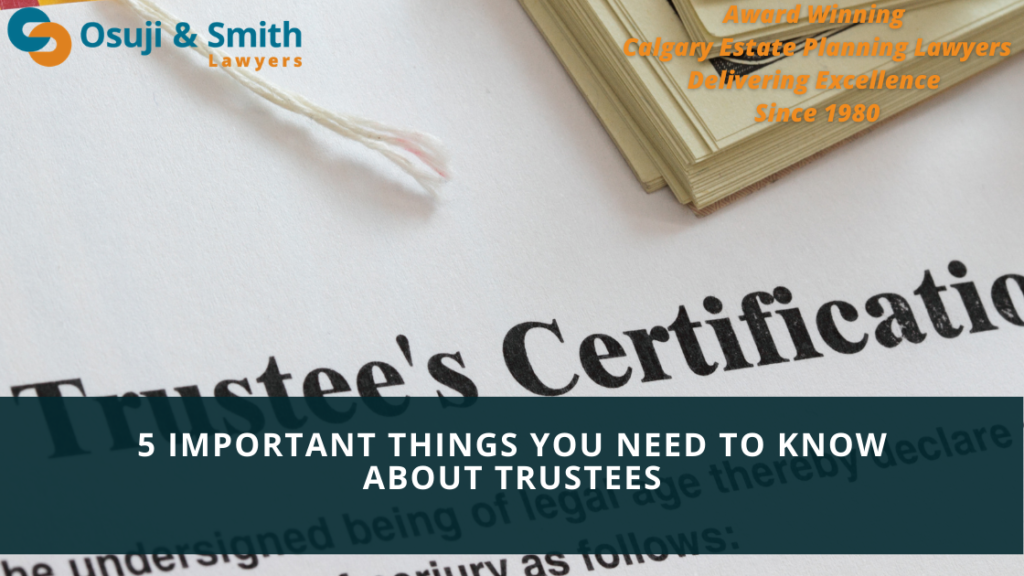 Estate planning sometimes includes a trust which is legal protection of your property to ensure it is distributed or managed according to your wishes. A trust can establish a trustee relationship in which you give control of your assets (money or property) to someone else (the trustee) who will manage it for a third party (the beneficiary).
Estate planning sometimes includes a trust which is legal protection of your property to ensure it is distributed or managed according to your wishes. A trust can establish a trustee relationship in which you give control of your assets (money or property) to someone else (the trustee) who will manage it for a third party (the beneficiary).
Here are 5 important things you need to know about trustees to ensure your estate is in the right hands and managed according to your wishes.
1. What is a Trustee?
A trustee is who you appoint as the “manager” of your assets on behalf of the ultimate beneficiaries. It can be an individual, a group, or a corporate entity. The trustee has decision-making power, but you can give as much direction to them as you want to.
The personal representative or executor of an estate automatically becomes a trustee.
The most common reason to appoint a trustee is when the beneficiaries of your estate are too young to handle the responsibility of managing it. In this case, the trustee will take on the role of estate manager until the beneficiaries are old enough to take over.
The trustee is not entitled to use the estate for their own benefit. Instead, they must act in the best interests of the beneficiary.
Being a trustee is a huge responsibility and one of the highest duties under the law.
2. What are the Duties of a Trustee?
The general duties of a trustee include:
- Managing and investing the trust’s assets;
- Making decisions about the care and education of the beneficiaries;
- Filing and paying taxes for the trust; and
- Distributing the trust’s assets at the appointed time.
Beyond those basic tasks, the trustee has other legal duties as follows. While they may sound daunting, a closer look reveals that these are generally common sense. This is simply how an honest person would act when in charge of someone else’s property.
The duty to obey the trust
The trustee must comply with the terms detailed in the trust documents. The trustee should own a copy of the trust documentation and read through it. He/she is required to know and understand the trust documentation. It is their own personal responsibility and is essential if they are going to act in accordance with the trust terms.
The duty to act impartially or with fairness
The trustee must give all beneficiaries equal consideration. The trustee cannot act as a judge or advocate, nor make decisions based on personal preference or opinion in favor of a single beneficiary.
The duty of loyalty
The trustee must act on behalf of the beneficiaries and in accordance with the wishes detailed in the trust documents. The trustee must set aside all personal interests and seek to act in the best interests of the beneficiaries. He/she must avoid any conflict of interest between his/her own personal interests and the interests of the beneficiaries.
The duty to act personally
For most decisions pertaining to the trust, the trustee is required to act personally. However, the law has made provision for delegation. In some situations and for specific functions, the trustee can delegate an agent to act instead. The specifics of this duty can be ambiguous, so consulting an estate law lawyer for clarity is recommended.
The duty to inform the beneficiaries
The trustee is required to provide accurate and complete information to the beneficiaries. In other words, the trustee is accountable to the beneficiaries. There must be documentation and clear information to account for the actions of the trustee with regard to the trust.
3. Does a Trustee Receive Compensation?
A trustee is entitled to some compensation for the time and energy they put into their duties. The amount of compensation is variable. By law, it can be “any fair and reasonable allowance” in accordance with the amount of work the trustee has dedicated to managing the trust. This amount can be determined by the courts.
4. What if the Trustee Doesn’t Do a Good Job?
The duties of a trustee are not to be taken lightly. If a trustee fails to act in accordance with the law and the trust documentation, they can be liable for negligence.
Negligence can be intentional or unconscious. That’s why it’s so important for a trustee to take responsibility to fully understand what is required and expected of them. To avoid negligence, a trustee must be diligent, careful, and reasonable.
Gross negligence goes even further. It is a voluntary act or omission in reckless disregard of the trustee’s legal duty and of the consequences to the beneficiaries. To be grossly negligent is to fall far below the expected standard of care. It happens when the trustee acts in conscious disregard for his/her duty.
Some examples of a negligent trustee are:
- Not properly securing assets in banks or trust companies;
- Not purchasing insurance for the property;
- Not maintaining the property, allowing it to fall into disrepair; or
- Not properly securing a physical property, such as changing locks.
A trustee is not liable for a loss in connection with an investment of trust funds when they were acting reasonably and prudently.
If a trustee is found to be negligent in their duties, there can be grave consequences. Typically, their compensation will be reduced, but they can also be required to personally reimburse the estate or pay the beneficiaries.
5. How Can a Trustee be Protected from Liability?
To avoid being found negligent, a trustee must gain full understanding of the trust documentation and keep detailed records accounting for their decisions and the state of the trust at all times. If it’s too overwhelming for the trustee, they are entitled to receive legal and financial advice paid from the trust.
Depending on the terms of the trust, it may protect the trustee from liability in a case of negligence. However, if the trustee is guilty of gross negligence or willful misconduct, the terms of the trust cannot protect him/her.
Protect Yourself from an Untrustworthy Trustee
Estate planning requires a tremendous degree of care. Prevent your estate from falling into the hands of an untrustworthy trustee. Consult with an estate lawyer at Osuji & Smith for help in safeguarding your estate, planning for the best interests of your beneficiaries, and advocating for your wishes.
If you’re a trustee and need help understanding the trust documentation, we’re here for you, too. We can assist you in administering the trust with diligence and helping you avoid negligence. There’s no need to feel like you’re in over your head. Let us help!




